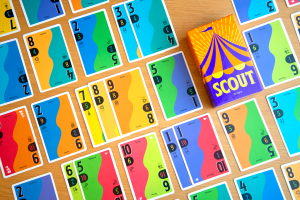
Kids and games; it can inspire passions, guilt, fun, frustration and a myriad of other emotions and feelings for parents. If you’re reading this and have kids or are an uncle/aunt etc… you are probably already willing and playing with kids. This is more for those who rarely to never play games with them. Its not an admonishment or me trying to be preachy because I do something you don’t. I understand if you don’t play with them, its not easy, but if you decide to give it a shot its worth it. I have 2 kids aged almost 11 and 9. They are full of life, lots of fun and can be annoying as all hell. I run a Board Game Cafe, so its not surprising they have played a tonne of games growing up.
They also play plenty of video games, it’s part of life nowadays and for a kid living in North America to try and avoid it is next to impossible. But there is time for both, but they are fairly mutually exclusive forms of entertainment. They are both a type of game, but really that is where the similarity ends, I don’t think they should be fighting for the same time slot.
Playing games with kids is tough. Unless you have the paitence of a saint or a genius child with the concentration of an adult, they can be frustrating little monkeys at the table. As I previously mentioned, my kids can play fairly heavy Euro games, but its a different experience to playing with other adults. With them I am the adult and entirely responsible for keeping the game moving and them on task. In other words, when I play with them, I’m still a parent and not wholly able to play for my enjoyment of the game. Lets be frank here, playing with kids has the following issues:
- They don’t pay attention and often have to be told its their turn (like 30 or 40 times a game).
- When they are young, you have to play super easy, fairly random games with them, which can be a little boring.
- They get into fights with anyone around them during the game when they don’t think things are being done correctly.
- They can turn into vessels of pure rage and injustice when they lose, utterly impossible to be reasoned with.
- If you play anything with a reasonable amount of strategy you just end up crushing them leading to previous bullet point.
- They won’t learn the rules to games and expect you to have to do it.
With that in mind plus the fact that nowadays we often have two income families and a million after school activities; is it any wonder we end up turning on the TV when we get the bit of free family time at home. It is so much easier. No judgement here, I do it and I often have to force myself to grab that game and play with them.
Once in a while though, try to play games with the kids. C’mon, dig into that energy reserve, you can do it.
One reason is because most of you who played games as a kid have very fond and powerful memories of it. The games were different back then, the distractions were also different, but playing with your family in a setting where everyone is genuinelly together and focused on doing something together is pretty special and quite a rare thing. There really is nothing else that brings you into an environment when you are focused on one thing as a social unit, that forces you to interact directly with one another for an hour or so. Meal times are quick, TV is passive, hikes and family outings have lots of other distractions. They are all great in their own way and we need them all, but none of them do what board games do.
Is it good for their brains? Probably, there are lots of articles out there arguing this way and that (mostly this way), but I assume board games promote learning/understanding of the following things:
- thinking: as in take your time, strategic thought.
- patience: sitting still for a while seems harder than it used to be (or maybe that’s just the perspective of the old).
- comprehension: you have to learn the rules to play after all.
- rules: no you can’t do that… why? The rules say so! I’m sorry, welcome to the real world my child.
- systems: that’s what most modern board games are. A series of interlocking systems that relate to each other in a variety of ways. Many jobs involve the understanding of systems (computers and every trade job out there).
- sportsmanship: they may not always display it, but they are slowly learning it.
- interpersonal skills: ugh, that sounds very ‘resume-ish’ but negotiating, talking and listening are kind of important.
Just remember this one thing though. Kids love games. So when you think about buying one, don’t buy for them, buy a game you like the look of. If you want to play it, they get to play it, and kids will play anything, they are just grateful you will play with them. There are a lot of great kids games out there nowadays if you know where to look. They are quick, have some simple but interesting choices and fun bits (see here for some examples). Also the sooner you play with them, the better they get at understanding rules and strategies and before you know it you are playing adult games with them. Their brains are sponges at that age and they pick up new ideas a lot faster than you. That Age 8+ on the back of the box is more for how difficult you will likely find it than them. You have to learn the rules though, which is the tricky part. YouTube, however, is a great resource for the visual learners out there. Almost every modern game has a series of videos on the internet, where someone has taken the time to learn a game and then explain it to you, so no excuses there. Just get out there are grab the game you want to play
So if this inspires you and you want to play a game with your family, please do me one last favor. Put the cell phone in a separate room (it will distract you, you know it will) and be there with your family, I promise you, you won’t regret it.





